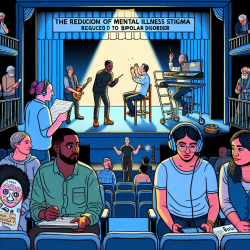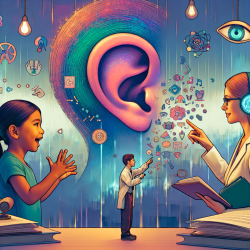Introduction
In the realm of mental health, stigma remains a significant barrier to effective treatment and quality of life for individuals with mental illnesses. A recent study published in the International Journal of Bipolar Disorders explores an innovative approach to combating this stigma through theatre. The study, titled Using theatre to address mental illness stigma: a knowledge translation study in bipolar disorder, investigates the impact of a theatrical performance on attitudes towards bipolar disorder (BD) among individuals with BD and healthcare providers.
Research Overview
The study utilized a one-woman theatrical performance, "That’s Just Crazy Talk," developed by a playwright and actress living with BD. The performance aimed to challenge stigmatizing attitudes towards BD. A mixed-methods approach was employed, combining quantitative and qualitative data to assess the performance's impact on 80 individuals with BD and 84 healthcare providers.
Key Findings
- Immediate Impact: Healthcare providers showed significant improvement in attitudes immediately following the performance. However, this change was not sustained over time.
- Qualitative Insights: Both individuals with BD and healthcare providers reported enduring positive changes, highlighting the performance's emotional and educational impact.
- Mixed-Methods Approach: The study demonstrated the utility of combining quantitative and qualitative methods to capture the nuanced effects of stigma-reduction interventions.
Implications for Practitioners
For practitioners, this study underscores the potential of creative arts-based interventions in reducing mental illness stigma. Here are some practical steps to consider:
- Integrate Arts-Based Approaches: Consider incorporating theatre and other creative arts into mental health education and awareness programs to engage audiences emotionally and cognitively.
- Promote Long-Term Engagement: While immediate impacts are promising, sustained efforts and follow-up interventions are crucial for long-term stigma reduction.
- Encourage Mixed-Methods Research: Utilize both quantitative and qualitative methods to gain a comprehensive understanding of intervention impacts.
Conclusion
Theatre, as a form of narrative medicine, offers a powerful tool for addressing mental illness stigma. By fostering empathy and understanding, theatrical performances can complement traditional stigma-reduction strategies. Practitioners are encouraged to explore creative arts-based approaches and contribute to further research in this promising field.
To read the original research paper, please follow this link: Using theatre to address mental illness stigma: a knowledge translation study in bipolar disorder.










